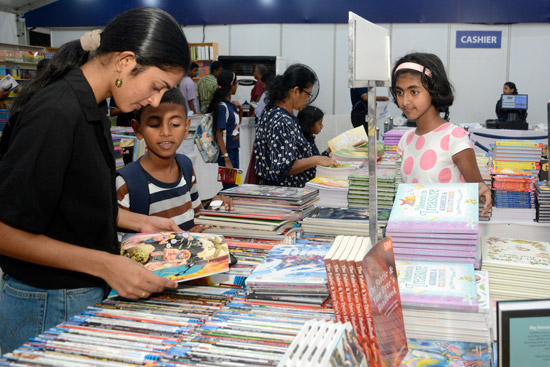Love of the written word in an evolving literary landscape
When I recall my first visit to the Colombo International Book Fair, two vivid images come to mind: the books filling every corner and the long queues extending to the main gate.
Some flipped through the pages of every book, while others examined the price tags to see the new discounts. Groups of young people gathered around food trucks, enjoying hot Maggi noodles and ice cream to beat the heat.
That was many years ago, and since then, attending the book fair has become a cherished family tradition. The annual book fair is not just a marketplace; it’s a cultural celebration. Each year, thousands of book lovers flock to this event, exploring diverse genres, meeting local authors, and engaging in literary discussions.

On its 25th year: The much-awaited Book Fair has begun. Pic by Priyanka Samaraweera
However, as technology changes the way we consume information, one question remains: What does the future of reading look like in Sri Lanka?
Since its debut in 1999, the Colombo Book Fair has become the foundation for the district-level fairs that followed. Currently, many book fairs take place in districts like Kandy and Galle, leading up to the Colombo International Book Fair.
This year, the Colombo International Book Fair celebrates its 25th anniversary, having grown into one of the largest literary events in the country. Organized by the Sri Lanka Book Publishers’ Association, it attracts readers, authors, and publishers from across the island.
This year’s event will feature local and international publishers, workshops, storytelling sessions, bilingual panel discussions, and author signings. The fair will also provide a platform for self-published authors and independent publishers, reflecting a growing trend in Sri Lanka’s literary landscape.
The rise of digital media and the growing popularity of e-books have also welcomed the reading community into a new dimension, beyond the usual hardcovers or paperbacks we see.
A study conducted in 2023 by the National Library and Documentation Services Board revealed that younger generations are increasingly shifting toward digital reading, a trend accelerated by the COVID-19 pandemic. E-books and audiobooks have gained popularity, particularly among university students and young professionals, who use platforms like Amazon Kindle, Scribd, and Google Books to access books without the constraints of physical availability or cost.
Despite this, traditional printed books continue to hold their charm. Social media platforms are filled with readers who share their passion for physical books. Hashtags like “#booktok” on TikTok, with over 70 billion views, showcase this global trend, and young Sri Lankan readers are part of this digital book-sharing culture, though many readers still insist that digital books cannot replace the tactile experience of holding a physical book or the nostalgic scent of paper.
Nevertheless, the shift towards digital reading has opened up new possibilities for Sri Lankan authors and readers. Digital platforms are enabling new authors to publish their works independently. Sri Lankan writers who may not have had the resources to publish traditionally are now turning to self-publishing platforms like Amazon and Wattpad to share their stories with a global audience. This trend is reshaping the
Sri Lankan literary landscape and fostering more diverse voices.
Technology, too, presents a paradox. While digital reading formats are making books more accessible, the distraction of smartphones and social media has reduced the time people dedicate to reading. A recent survey revealed that the average Sri Lankan spends more time on social media than reading, a trend mirrored globally. This shift towards digital consumption has ignited concerns among educators and parents, who fear that young people are losing the habit of focused, deep reading.
Another challenge is the limited availability of libraries, particularly in rural areas. While urban centres like Colombo have access to public and private libraries, readers in rural regions often struggle to find books. This disparity is one of the key factors contributing to the decline in reading habits in certain parts of the country.
Despite these challenges, the future of reading in Sri Lanka holds promise, especially as schools and universities are integrating e-libraries and digital learning platforms, making books and reading materials more accessible to students.
Looking ahead, the future of reading in Sri Lanka is likely to be a blend of traditional and digital formats. The love for printed books will continue among certain groups, while younger generations may embrace the convenience and accessibility of digital reading.
In the end, whether in print or digital form, the love for reading will endure. And just as I cherished my early visits to the Colombo International Book Fair, future generations will find their own ways to connect with the written word in an ever-evolving literary landscape.
Searching for an ideal partner? Find your soul mate on Hitad.lk, Sri Lanka's favourite marriage proposals page. With Hitad.lk matrimonial advertisements you have access to thousands of ads from potential suitors who are looking for someone just like you.


